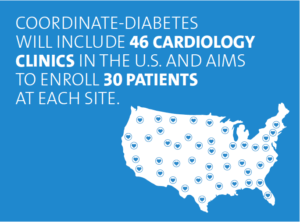
The DCRI’s Neha Pagidipati, MD, MPH, is the faculty lead for the COORDINATE-Diabetes trial, along with the DCRI’s Christopher Granger, MD. Diabetes is increasing in epidemic proportion, and the most devastating consequence is cardiovascular disease. It is possible to prevent death, heart attack, and stroke in patients with diabetes, but only a small percentage of patients in the U.S. are getting the necessary treatments.
To achieve the DCRI’s mission of improving patient care with innovative research, COORDINATE-Diabetes seeks to ensure that people with diabetes and cardiovascular disease receive these life-saving, evidence-based therapies. Pagidipati discussed the work with Monica Reed, MHA, a clinical research associate and quality improvement specialist at the DCRI who is helping to lead the intervention arm of the trial.
NEHA: Implementation science is an important and growing field. Even though we have medications that help make patients healthier, many patients aren’t receiving the evidence-based therapies they should be. We need rigorous scientific methods to help us understand how we can improve in clinical practice, and implementation science will guide that.
MONICA: Completely agreed. Through the COORDINATE trial, we are focusing on intensive education, which starts with our faculty, both at the DCRI and from external partner institutions. We assemble teams of three experts—a cardiologist, an endocrinologist, and a quality improvement specialist—who visit sites to talk about the guidelines, care pathways, and what the sites are doing that is working, as well as what isn’t.
Each site has different challenges because each one is unique, from smaller community-based sites to larger sites based in academic centers. Our team helps identify both opportunities and challenges, as well as strategies to address them. We have created a toolbox of resources that our sites can use in clinic, such as a set of pathway examples and a learning module system based on the guidelines.
After our site visit, we also deliver a comprehensive analysis tailored to each clinic that the sites can use to create an action plan. As sites implement their strategies, we continue to work with each one-on-one. We also invite sites to collaborate with each other; it’s exciting to see clinicians in the real world partnering to share ideas that work.

NEHA: Agreed. This collaboration has been really inspiring to see. Some of our greatest advances have come from brainstorming with sites, as they can share real examples of the roadblocks they are seeing and we can work together to find solutions.
MONICA: Right. Being able to have peer-to-peer conversations at the clinic level that are open and collaborative is key, and at each site visit we learn something new.
NEHA: COORDINATE is a team-based approach to bettering patient care. There’s a great partnership at the DCRI between clinical faculty, quality improvement experts, and operational experts who know how to work with sites to achieve shared goals.
MONICA: It’s also important that our deliverables to these sites are sustainable over time. These collaborations are key so that we can continue to share concepts and make improvements in patient outcomes as we move forward.
This article originally appeared in the DCRI's 2018-2019 Annual Report. View more articles from this publication.